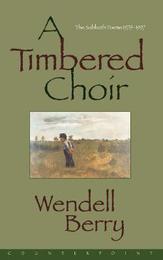
|
A Timbered Choir: The Sabbath Poems 1979-1997
Paperback / softback
Main Details
| Title |
A Timbered Choir: The Sabbath Poems 1979-1997
|
| Authors and Contributors |
By (author) Wendell Berry
|
| Physical Properties |
| Format:Paperback / softback | | Pages:240 | | Dimensions(mm): Height 203,Width 127 |
|
| Category/Genre | Poetry by individual poets |
|---|
| ISBN/Barcode |
9781582430065
|
| Classifications | Dewey:811.54 |
|---|
| Audience | |
|---|
|
Publishing Details |
| Publisher |
Counterpoint
|
| Imprint |
Counterpoint
|
| Publication Date |
19 March 1999 |
| Publication Country |
United States
|
Description
For more than two decades, Wendell Berry has spent his Sunday mornings in a kind of walking meditation, observing the world and writing poems. A small collection of Berrys Sabbath poems were published in 1987, but A Timbered Choir gathers all of these singular pieces to date.. Berrys Sabbath poems embrace much that is elemental to human life--beauty, death, peace, and hope.In his preface to the collection, Berry writes about the growing audience for public poetry readings. While he sees poetry in the public eye as a good thing, Berry asks us to recognize the private life of the poem. These Sabbath poems were written in silence, in solitude, and mainly out of doors, and tell us about moments when heart and mind are open and aware.Many years of writing have won Wendell Berry the affection of a broad public. He is beloved for his quiet, steady explorations of nature, his emphasis on finding good work to do in the world, and his faith in the solace of family, memory, and community. His poetry is assured and unceasingly spiritual; its power lies in the strength of the truths revealed. For more than two decades, Wendell Berry has spent his Sunday mornings in a kind of walking meditation, observing the world and writing poems. A small collection of Berrys Sabbath poems was published in 1987, but A Timbered Choir gathers all of these singular poems written to date.In his preface, Berry tells us that his Sabbath poems were written in silence, in solitude, mainly out of doors, and his hope is that readers will read them as they were written: slowly, and with more patience than effort. This wish proves unusually rewarding, for Berrys voice is quiet, meditative, and wholehearted. He reminds us that there is a quietness which allows us to pay closer attention to the world and our place in it. Berrys evocation of the natural world shows us time and again the exquisite beauty of the commonplace. He writes of walking away from his home, turning, and seeing the landscape transformed by spring: In its time and great patience/ beauty had come upon us/ greater than I had imagined. He writes, also, of dark revelations; the day, for example, when his granddaughters visit the Holocaust Museum: Now, you know the worst/ we humans have to know/ about ourselves, and I am sorry. Berrys Sabbath poems embrace much that is elemental to human life--beauty, death, peace, and hope.Many years of writing have won Wendell Berry the affection of a broad public. He is beloved for his quiet, steady explorations of nature, his emphasis on finding good work to do in the world, and his faith in the solace of family, memory, and community. His poetry is always poised and unceasingly spiritual; its power lies in the strength of the truths revealed.
Author Biography
Wendell Berry is the author of fifty books of poetry, fiction, and essays. He was recently awarded the Cleanth Brooks Medal for Lifetime Achievement by the Fellowship of Southern Writers and the Louis Bromfield Society Award. For over forty years he has lived and farmed with his wife, Tanya, in Kentucky.
|